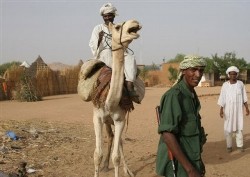Sudanese militiamen disarm, say they not Janjaweed
By Nima Elbagir
GENEINA, Sudan, Aug 27 (Reuters) – Five hundred Sudanese militiamen in government service disarmed in western Darfur on Friday at a ceremony attended by U.N. envoy Jan Pronk, due to next week report on the security situation in the region.
 The uniformed members of the Popular Defence Forces, an official militia recruited to fight Darfur rebels, handed in rifles, machineguns and other light weapons at the militia headquarters in Geneina, capital of West Darfur state.
The uniformed members of the Popular Defence Forces, an official militia recruited to fight Darfur rebels, handed in rifles, machineguns and other light weapons at the militia headquarters in Geneina, capital of West Darfur state.
But the men said they were not Arab Janjaweed irregulars blamed for killing, raping and looting in Darfur in a campaign of ethnic cleansing aimed at African villagers.
“We did not arm them for ethnic cleaning or genocide but so that they might maintain security and stability in their areas… There are no outlaws or Janjaweed amongst them,” said Mahmoud Zein al-Abdin, the commander of their unit.
One of the commanders said 1,500 of the militiamen would hand in their weapons by September 1.
Pronk was on his last field trip before reporting to U.N. Secretary-General Kofi Annan in New York on whether Khartoum is meeting its commitment to disband the Janjaweed and improve security for refugees, or face possible sanctions.
He told the men they had done the right thing and the United Nations would press the Darfuri rebel forces to follow suit.
Sudan has a few days left to prove that it is making progress on compliance with the U.N. Security Council resolution passed on July 30.
At a separate event later on Friday, Pronk and Sudanese Foreign Minister Mustafa Osman Ismail saw evidence of the tensions among the hundreds of thousands of people displaced by the conflict and now living in temporary camps.
A group of displaced people at Morney camp near Geneina accused an old man of being “Janjaweed” and beat him with heavy sticks, seriously injuring him, after he spoke up at a meeting with the two visiting dignitaries.
Pronk had reassured the people in the camp that they could stay as long as they felt it was not safe to go home, but the residents complained that even the camp was not safe.
An aid worker said security was improving but the people were so traumatised by the events of the past year that they found it hard to believe that the worse could be over.
The rebels and human rights organisations say the government armed and organised the Janjaweed to fight the rebels, who took up arms against Khartoum in early 2003 demanding a greater say in government for the people of the region.
But the government says those responsible for any excesses or abuses are outlaws who were never under government control.
The conflict has driven more than a million Darfuris from their homes into temporary camps where they depend on international aid. About 200,000 of them have fled to Chad.
The rights group Human Rights Watch said on Friday the Sudanese government has allowed the Janjaweed to maintain at least 16 camps in Darfur in defiance of the United Nations.
COMMANDERS NAMED
It named the camps in a report and gave details of where they were, who was in command of them, what facilities they had and how many militiamen were based there.
The organisation said the U.N. Security Council must impose sanctions on Khartoum for failing to disarm the militias.
“Throughout the time Khartoum was supposedly reining in the Janjaweed, these camps have been operating in plain sight,” Peter Takirambudde, executive director of the Africa division of Human Rights Watch, said in a statement.
“These Janjaweed camps should be immediately investigated by the U.N. and the African Union ceasefire monitors, then disbanded,” he added. The two main rebel movements — the Sudan Liberation Movment and the Justice and Equality Movement — have so far refused to disarm, saying the Janjweed must do so first.
Some of the Popular Defence Forces militiamen complained that the arrangements were unfair and they were now at risk.
“They will hear about our disarmament and tomorrow they will attack us and take our camels,” said Idris Hassan, a member of an Arab tribe which lives north of Geneina.
“We are not educated. We have no one to raise our case at the United Nations. We have no resources. All we have now is the the sword and the axe and the stick, and no one was protecting us in West Darfur,” he added.
